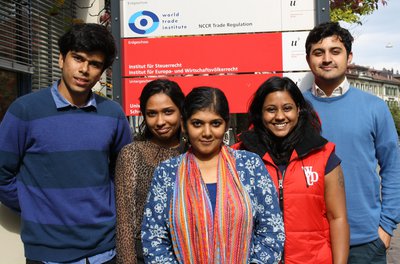17 Oct 2014
“The WTI offers us a different perspective”
The WTI has in recent months strengthened cooperation with Indian institutions and launched a new international trade law course in New Delhi. Partly as a result of this increased visibility, no fewer than five students from India are enrolled on this year’s Master of International Law and Economics (MILE). In this interview Rishab Raturi, Vinitha Johnson, Sayoni Chadhuri, Varun Eknath and Gayatri Sashidharan explain why it was important for their careers to come to the WTI.
You are all lawyers. Did you hear about the MILE programme from your law school?
Varun: The WTI coordinates the Moot Court competition with Gujarat National Law University. If you win the Moot you are entitled to attend the Summer Academy at WTI. That was a big incentive to do the Moot and I think it was there that I was first exposed to the MILE programme.
Gayatri: For me, I was looking for articles related to trade and development – just a random search. There were some publications from WTI and that’s how I learned about it.
Sayoni: One of my professors had been at a conference here and knows Prof. Cottier. My professor suggested this place and said, ‘if you want to go for trade, WTI is the best’.
Vinitha: I have a background in trade law. I specialised in trade and investment law during my undergraduate studies and as a practitioner I worked on the policy side quite a bit. I realised I needed to merge the study of law with economics, and this is clearly the best institute for that.
Rishab: In my case there was a negotiation competition in 2012 jointly organised by the WTO at the University of St. Gallen, and I happened to win that, which brought me to the Summer Academy here. And I also met a lot of students from the WTI who were also participating. I guess it was the Summer Academy that really influenced me.
What are your expectations of the MILE programme?
Sayoni: I have just come to gain as much knowledge as I can about the various trade laws and related issues so that when I am done with the MILE programme I will be a knowledgeable trade lawyer in the market.
Varun: What I’m expecting is basically to imbibe knowledge of so many fields at the same time so I’m not limited to the study of law as I was back home. It gives you the perspective of economics and political science which is pretty useful in today’s world.
Vinitha: Generally I think this is a very interesting time to be here, like with the EU and FTA and the current state of negotiations at the WTO. It’s critical to be able to observe it from here and not back in our home country. So that’s definitely a perspective that we’re all going to benefit from.
Gayatri: I did development studies, so what I am looking for is an opportunity to learn more about trade and development issues, especially focusing on sections in Indian society who don’t seemingly benefit from trade, who get marginalised even if there’s a section that prospers. So I hope this programme will help me understand certain phenomena.
Varun: I think that’s an important point because the WTI gives you a platform to understand a different perspective – the perspective of the first world. It’s a good platform for an exchange of ideas on international organisations.
Rishab: I think what really clinched it for me was the faculty at the WTI. We count WTO panel and appellate body members and people working in some of the biggest firms amongst our faculty, and they have a very insightful perspective in this field. They know how the system functions. In India, the importance of the subject is gradually increasing but our primary source of information is through text books written, in most cases, by these very people. To seek a deeper understanding of the subject, I worked with a respected academician in this field after graduating from law school. He too was of the opinion that the faculty here is the possibly the finest in this field of law.
Are you planning on returning to India after the course?
Vinitha: My main objective is to go back and advise trade associations on cross-border lobbying. For that I’d like to stay in the developed world for some time and make connections.
Rishab: I still haven’t decided what I want to do. I think the most important thing right now is not to think about the future but just to learn in the present!
Gayatri: I would like to go back to India because I want to see what I can do there. I know that there are a lot of women in the informal sector who work in sweatshops. Their labour adds value to goods that are traded internationally. I am particularly interested in working in areas that deal with issues of both trade and social policy simultaneously.
Sayoni: At present I’m not sure if I want to go to India directly from MILE. I want to see how the economy works apart from India. So maybe I’ll stay over here in Europe and then when I’ve got a bit of experience I’ll go back to India and supplement my knowledge.
Varun: I’m going to echo what Rishab said: live for the present, let the future decide what it holds for you. But I want to go back to India and work on development issues. I’d like to work in a sector that needs good practitioners.


